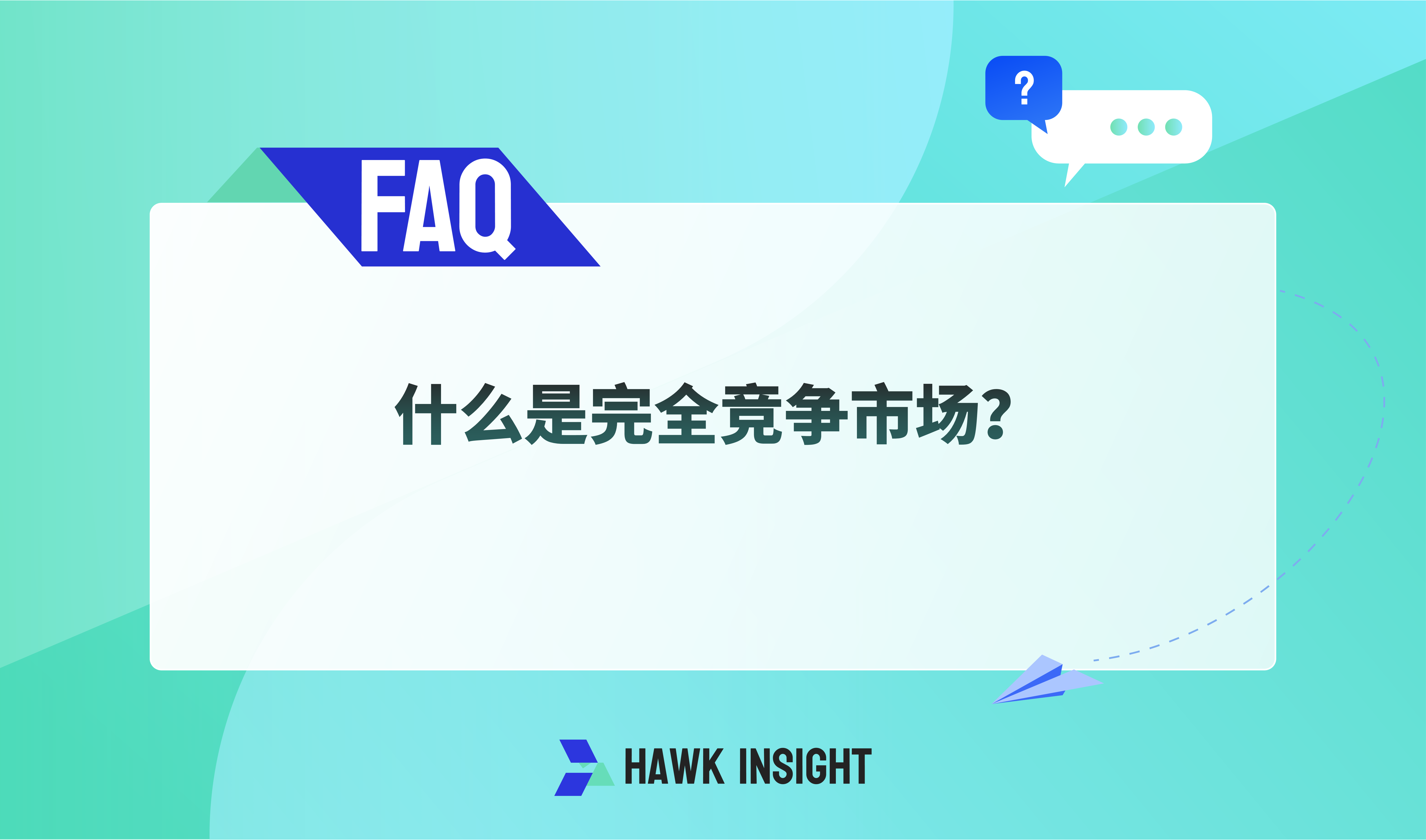What is a perfectly competitive market??
Perfect competition describes a hypothetical market condition in which the market has the maximum possible level of competition.。Among other things, it needs to have many buyers and sellers, and new companies can easily enter or exit the market。
Definition
Perfect competition is a hypothetical market condition in which competition is at the highest possible level and no individual buyer or seller can influence the market price of a product。

Introduction to Perfect Competition
In economics, perfect competition is the market state that occurs when several conditions。First, there are many buyers and sellers for a particular product。Second, it is easy for new businesses to enter and exit the market.。Third, many companies produce the same product。Fourth, buyers and sellers have all the information they need to make rational decisions.。
The opposite of perfect competition is monopoly.。In fact, perfectly competitive markets do not exist。However, some markets are more competitive than others。
For instance
Real-world examples of perfectly competitive markets do not exist, as evidenced by lemonade stands near the suburbs。
Every kid on the street has one, so there are a lot of sellers。All adults drink lemonade regularly, so there are many buyers。The stalls are easy to set up and low cost, so if a new family moves in, their children can easily set up a stall。All sellers buy goods in the same store and make lemonade in the same way, so the products are the same。All buyers and sellers are fully aware of the information they need to make decisions, such as fees charged by others。

What is perfect competition??
There is no perfect competition in the real world (agriculture and foreign exchange markets are closest)。For a market to be perfectly competitive, it must have the following characteristics.
Large number of buyers and sellers
In a perfectly competitive market, there are so many sellers that consumers can buy products anywhere, and no single company has enough market share to control it.。Similarly, if there are enough buyers as a prerequisite, no one can influence the price on their own。
homogeneity of products
Homogeneous products are the same products offered by different sellers, and this consistency is another feature of perfectly competitive markets。For example, every store will sell the same coffee machine。Buyers don't discriminate against sellers because they know those are the same products。
Lack of entry or exit barriers
In perfectly competitive markets, there are no barriers to entry or exit。Any company is free to enter or leave the market without barriers such as start-up costs, licensing requirements or patents。
In real markets, there are often barriers to entry。Depending on the market, the cost of starting a business can be very high。In some industries, this can even lead to natural monopolies because it is too expensive for new businesses to enter the market.。
One example is utility companies, from a cost and logistics point of view, it doesn't make sense for a group of utilities to provide electricity to a city。The U.S. government allows this type of monopoly, but regulates it to ensure that companies don't take advantage of consumers.。
perfect knowledge
Perfect competition requires consumers and sellers to have full knowledge of consumption and production.。They can immediately and freely know all prices and products of all suppliers and any changes in the market。
Because of the perfect information, consumers are always able to make the most rational purchase decisions。Companies also don't need to advertise because consumers have access to all the information。
Lack of government intervention
A perfectly competitive market lacks government influence, and companies can enter the market without having to comply with any regulations.。Lack of intervention is a key factor in ensuring that there are no barriers to entry。
However, there is usually some government intervention in the real market。The government may regulate who can enter the market by requiring permits。Other industries may have government intervention in the form of price controls, such as price caps or price floors。An example of a price floor is the minimum wage, which is the lowest price a company can legally pay for labor.。
A company cannot influence prices
In a perfectly competitive market, no one firm can influence the market price of a product。In other words, each firm is a price bearer, not a setter。If a company raises its price, consumers will buy the product from another seller。
In a perfectly competitive market, buyers do not have any attachment to sellers due to the homogeneity of products and full price transparency。The company will also not charge a lower price because there will be no incentive or resulting profit。
All businesses earn normal profits
In this hypothetical market, all firms make normal profits。In other words, each company has only enough revenue to stay in business without any excess profits.。
What is the difference between imperfect competition and monopoly competition??
Any market does not have all the characteristics of perfect competition, but only imperfect competition.。In this type of market, sellers must work harder to get business - they must compete for market share by setting competitive prices and advertising to consumers。Barriers to entry prevent anyone from entering。
Only a few buyers or sellers may be able to influence the price。Buyers and sellers do not always fully understand all products and prices, or must pay to obtain this knowledge, and there are differences between products。Some companies make more money than others - some have high profit margins and some go out of business。
Imperfect competition applies to almost every industry in every economy, and this model of competition has a wide range of markets, from monopolistic to highly competitive industries。
Monopolistic competition is a form of imperfect competition.。A monopoly is a company that dominates a sector and controls prices, the barriers to entry for new companies are low, and one company's pricing decisions rarely have a significant impact on other companies in the market.。There are many competitors (and many buyers) in the game, and many companies offer similar but not identical products and services。Companies strive to make themselves and their products look unique (or through advertising)。Theoretically, monopolistic competition can achieve this goal in the long run, even if it does not generate normal profits for the company in the short term.。
Restaurants are one example of monopolistic competition。A city has a lot of restaurants and a lot of potential customers。Many restaurants offer similar food at similar prices, but they are not interchangeable。Each restaurant strives to stand out from the crowd and offer a unique dining experience。They strive to make their food, service and atmosphere better than their competitors and use advertising to attract potential customers。
Advantages and Disadvantages of the Perfect Competition Model
In many ways, perfectly competitive markets are best for consumers because there are no opportunities for manipulation or exploitation。Buyers have all the information they need to make rational decisions, so marketing can't influence them。Consumers can get the same products no matter where they go, and companies cannot charge them too much because all companies cannot have enough market share and all products are the same。Every consumer can get the product at a reasonable price。
Perfect competition not only does not exist, but it also has adverse effects on buyers and sellers, and prevents buyers from finding better products。Suppose someone wants to buy a TV, but they are not satisfied with the current model and want better features。But the problem is that every store sells the same TV, and consumers can't get different products in different stores.。
Perfect competition is also a problem for suppliers。First, companies are not very motivated to enter the market because they do not earn high profit margins。After all, people do business for profit.。
Perfectly competitive markets also lack opportunities for innovation。Apple made history with the release of the iPhone in 2007 - the first of its kind。In a perfectly competitive market, the iPhone wouldn't exist.。First, Apple does not have working capital (the difference between the company's assets and liabilities) to invest in iPhone research and development, but only to maintain business operations.。Apple can't sell its products at higher prices than its competitors.。Any company can immediately enter the market and produce the same product。
At first glance, perfect competition may seem beneficial to everyone, but it will eventually eliminate our ability to get what we want from products and eliminate the incentive for innovation。
Disclaimer: The views in this article are from the original Creator and do not represent the views or position of Hawk Insight. The content of the article is for reference, communication and learning only, and does not constitute investment advice. If it involves copyright issues, please contact us for deletion.